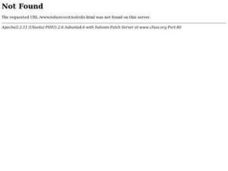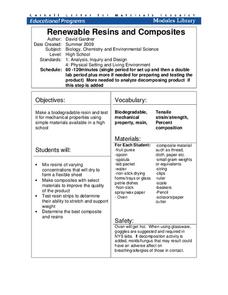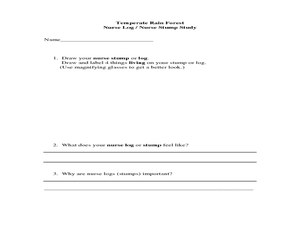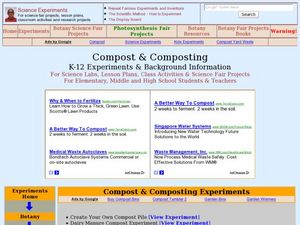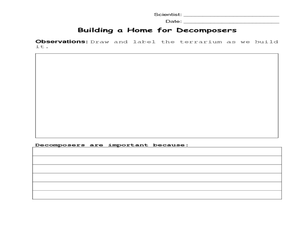Curated OER
Down the Drain
Pupils examine the following concepts: If water supplies contain materials which rot or decompose, oxygen is used. Decay and decomposition require vast supplies of oxygen. The use of oxygen for decay of wastes may be a life or death...
California Academy of Science
Composting: A Scientific Investigation: California Academy of Sciences
Garbage, recycle, compost: Does it really matter where we put our trash once we are done? By making detailed observations over seven weeks, kids will see which materials break down naturally to become a healthy part of the soil, and...
Montana State University
Climb into Action!
Climate change affects even the largest and intimidating of landforms—even Mount Everest! A resource helps teach learners the connection between global climate change and its effects on Earth. Activities include videos, class discussion,...
United Nations
Compost Monitor Training
What should go in the trash, and what can be composted? Guide your young conservationists through the process of composing their trash with a lesson about the different ways we can dispose of garbage. Using a trash bag with clean...
California Academy of Science
Carbon Cycle Role Play
Anytime you make concepts clear with role playing or hands-on experience, it's a win for the whole class. Ping-Pong balls are used to represent carbon in a carbon cycle role-play activity. In small groups, children first discuss what...
Curated OER
Solid Waste and Recycling
Students demonstrate effects of waste on environment and ways of reducing it, observe how much packaging goes into bag lunches each day, and survey their families to assess awareness levels and household recycling practices. Lessons all...
Cornell University
Renewable Resins and Composites
Merge chemistry with environmental science to study biodegradable materials. An engaging activity allows learners to experiment with different resin concentrations and composites. Through experimental tests, scholars test their creations...
Curated OER
Mold
Students explore mold, the different types and the health risks that they pose. In this mycelium lesson students grow different molds and see which type of foods mold the fastest.
Curated OER
F.B.I.
Students create a worm bin full of fruit and vegetable scraps wit paper and observe what happens over time. In this decomposers lesson plan, students observe that the fruit and vegetable scraps become new soil.
Curated OER
Nature's Recycling Program
Students identify what materials make up compost. In this science of recycling lesson, students explain the benefits of composting determine how compost is a good plant fertilizer.
Curated OER
Temperate Forest : Pacific Spirit Field Trip
Students examine nurse logs with hand lenses and identify animals. In this ecosystem lesson, students gain understanding of the rainforest by studying nurse logs. Students become familiar with vocabulary through their study...
Curated OER
Pollution Assessment: Is Wood Lake a Good Lake?
Students become aware of pollution in Richfield Minnesota's Wood Lake, identify sources of pollution in Wood Lake, learn to use variables, equations, spreadsheets and modeling software, and generate solutions for the problem.
Curated OER
Prairie Food Chains & Webs
Students complete a food chain. In this ecosystem lesson, students learn about producers, consumers and decomposers. Students identify herbivores, carnivores and omnivores and complete two worksheets.
Curated OER
Mulch
High schoolers conduct a series of experiments on mulching. In this earth science lesson, students discuss the benefits of mulching on soil. They explore how different types of mulch affect plant growth.
Curated OER
What Causes Tooth Decay
Learners investigate oral hygiene. In this personal health instructional activity, students discover the parts of a tooth and how to best protect them from disease. Learners examine the effects of acids on tooth enamel and...
Curated OER
Compost and Composting Experiments
Students investigate the composting process through a variety of experiments. In this ecology lesson, students discuss the benefits of composting. They examine how compost affect plant growth.
Curated OER
Explore More About Bottle Construction
Students explore Green Construction. For this lesson based on the experiences of Peace Corps volunteers, students gain insight into alternative construction in Guatemala. They examine the pros and cons of using alternative building...
Curated OER
Causal Patterns in Ecosystems Section 3
Students design and create a worm and worm free compost tanks for observation of decay in ecosystems. They make predictions, care, and revist tanks using their journals for observation and data collection.
Curated OER
Urban Life: What Lives In Our Local Park?
Fifth graders participate in activities during a visit to Central Park. In this urban life lesson plan, 5th graders visit Central Park where they explore pond dipping, stream chemistry, and play a native plant Bingo game.
Curated OER
Illegal Dumping
Students go on an outing and note garbage near picnic tables. They brainstorm ways to be involved with anti-litter campaigns and write letters to local officials.
Curated OER
De-composers - Terrarium
Learners explore the environment by building a mock ecosystem. In this rainforest analysis lesson plan, students define many environmental and rainforest related vocabulary terms and discuss the current status of our planet's...
Curated OER
Biochemical Cycles: Recycling Carbon and Nitrogen
Students construct flow diagrams of the carbon and nitrogen cycle processes. They identify sequences in each cycle that are affected by human impact and present their research to the class.
Curated OER
Bugs in the Woods
Second graders identify insects and plants in the forest ecosystem in a structured field trip with stations and activity booklets. In this bugs lesson, 2nd graders explore the ecosystem of the forest, complete the booklet and play...
Curated OER
Collecting Compost
Students observe a composting box. In this soil lesson, students create a composting bin by using a bin, newspaper, worms, and food scraps. Students create a composting food web.





